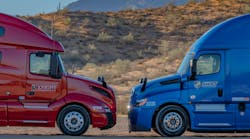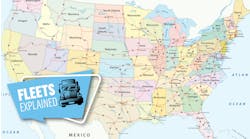Coming off a third quarter in which their operating profits jumped more than 60%, the leaders of Knight-Swift Transportation Holdings Inc. said Oct. 20 that they plan to ramp up their intermodal capacity in coming quarters.
Intermodal isn’t (yet) a big business for Phoenix-based Knight-Swift, accounting for just 8% of its more than $1.6 billion in revenues in the third quarter. But the division grew 14% year-over-year in the three months ended Sept. 30 and its profitability is rising—despite congestion cutting load count more than 10% from the spring. Thanks to a 26% jump in revenue per load, the unit product operating profits of $9.5 million on net revenue of nearly $113 million.
CEO Dave Jackson and his team are looking to capitalize on that momentum and their planned railroad partner switch to Union Pacific from BNSF. Between now and the end of March, they are looking to add about 1,000 containers to a fleet that has averaged about 10,850 this year.
In its earnings report, the Knight-Swift team also said it expects the current strong pricing environment to carry well into 2022, with contract rate increases in double digits. That will help the company continue to executive on its expansion plan, which has included the July acquisition of less-than-truckload (LTL) carrier AAA Cooper Transportation for $1.35 billion as well as the smaller purchases earlier this year of third-party logistics venture UTXL and software company Eleos.
“This diversification has allowed us to grow revenue and earnings across multiple segments, and we expect will lead to earnings growth in 2022,” Jackson said in a statement. “We continue to generate meaningful free cash flow that we plan to invest in both organic and inorganic growth into the future that will support our expansion into LTL as well as third-party carrier services.”
The LTL segment that now houses AAA Cooper produced operating profits of $17.5 million on sales of $168 million in the three months ended Sept. 30. Knight-Swift execs said they are still integrating the operation and working on growth and cost-saving opportunities.
Along with their Q3 results, Jackson and his team also lowered their forecast for full-year capital expenditures to a range of $450 million to $470 million from the previous range of $500 million to $550 million. The move, which echoed commentary last week from Knight-Swift’s peer J.B. Hunt Transport Services, was due to snags in the global supply chain that have resulted in fewer equipment deliveries than expected.
Share of Knight-Swift (Ticker: KNX) rose about 7% on the heels of the earning report, pushing the company’s market value beyond $9 billion. Year to date, Knight-Swift earnings have risen more than 20%.




